For the first time in COP history, the Presidency has acknowledged the role of digitalisation in climate talks, designating a Digitalisation Day. The 2024 UN Climate Change Conference in Baku, Azerbaijan, will feature the Green Digital Action track, emphasising the role of digitalisation in climate resilience. Digital technology offers immense potential to enhance food production and supply efficiency in Africa, promising significant economic, social, and environmental benefits.
Driving transformative climate action
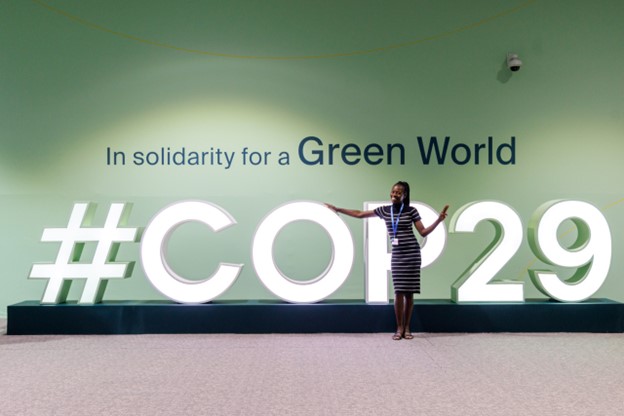
On November 16, 2024, two key events will occur: a high-level meeting and the Declaration on Green Digital Action launch, both focusing on how digital technologies can drive transformative climate action.
The High-Level Roundtable on Digital Action Path 4 Green World will explore how technology can advance climate goals. Key speakers include H.E. Ms. Nigar Arpadarai, Climate Change High-Level Champion for COP29; H.E. Mr. Rashad Nabiyev, Minister of Digital Development and Transport of Azerbaijan; and H.E. Ms. Doreen Bogdan Martin, Secretary-General of the International Telecommunication Union (ITU).
The roundtable, moderated by Mr. Tomas Lamanauskas, Deputy Secretary-General of the ITU, will feature insights from government representatives from Bahrain, Brazil, China, Egypt, Estonia, Japan, Kazakhstan, and more.
The event will also bring together partners like the IAEA, UNECE, UNCTAD, UNDP, UNEP, UNESCO, UNIDO, World Bank, and private sector leaders from companies like Alibaba, Cisco, Google, and Nokia.
COP29 Declaration on Green Digital Action

The high-level meeting will conclude with adopting the Declaration on Green Digital Action, a global commitment to promote climate-positive digitalisation, reduce ICT emissions, and expand access to green technologies.
The Declaration calls for collaboration among governments, the private sector, and international organisations to advance sustainable digitalisation, especially in developing regions. It encourages regulatory frameworks that support eco-friendly digital practices, positioning digitalisation as a key element in global climate action. Governments and stakeholders are invited to endorse the Declaration, joining a unified effort to leverage digital innovation for a sustainable future.
We are excited to welcome the fourth iPRIS cohort, 2024C! From November 10–27, regulatory experts from Liberia, Ghana, and Zimbabwe will dive into an intensive 2.5-week training, connecting, learning, and growing together for a stronger telecom future in Africa.
The 2024C group of participants will be the fourth cohort to participate in the iPRIS project after the first Francophone group participated in their first peer-to-peer training in Luxembourg. The French cohort was preceded by two English-speaking cohorts and a French-speaking cohort. The first iPRIS cohort 2023A, comprising regulators from Nigeria, Kenya, Namibia, Eswatini, South Sudan, Zambia, and Sierra Leone are set to complete their iPRIS cycle this year.
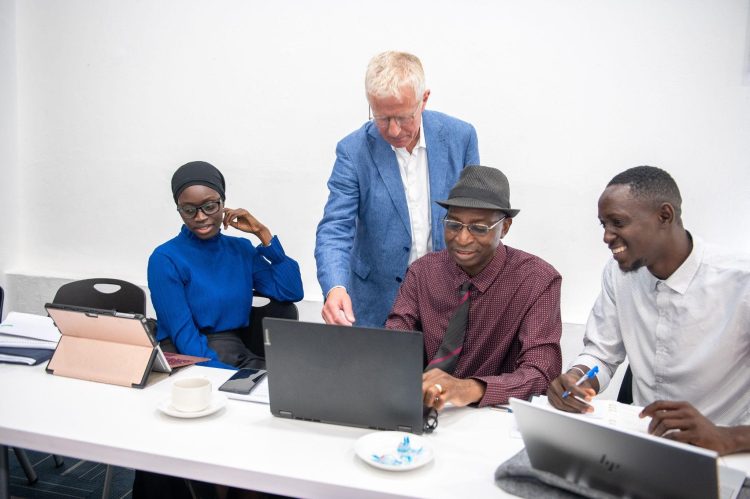
Telecom experts from The Gambia and Dr Bengt Mölleryd from SPIDER reviewing the change initiative project plan during the iPRIS peer-to-peer session in Dar es Salaam in September 2024.
The 2024C of this year's cohort will meet for one week after four months in one of the African countries represented in their group for the Africa phase. This week-long meeting will provide a platform for participants to review the progress of their change initiatives, share results, and engage in discussions to enhance their change initiatives further. One year after the round begins (Nov 2025), the efficacy and progress of the change initiatives implemented by the participating NRAs will be evaluated in partnership with the participating African and European telecom experts.
The 22nd Annual Meeting of the French-speaking network for telecommunications regulation (Fratel) will take place in Libreville, Gabon, from November 26 to 27, 2024. Hosted by Gabon's Electronic Communications and Postal Regulation Authority (ARCEP), this year’s gathering will focus on the theme: “Future Business Models and Strategies for Telecom Operators.”Fratel, the French-speaking telecommunications regulation network created in 2003, aims to contribute to training and collaboration between its members.
This convention will feature dedicated sessions for those engaged in improving telecommunications services and regulations. Two additional meetings for Fratel members and authority leaders will also address " What are the regulations for investments and innovations?"
This event will serve as an appropriate platform for regulators and other key telecom sector stakeholders to share their views about the regulatory structure for the future.
Get more information about this event here.
The 2024A Africa Regional follow-up phase was held in Dar es Salaam, Tanzania, from 7 to 10 October 2024. The official opening was graced by Dr Jabiri Kuwe Bakari, Director General of Tanzania Communications Regulatory Authority (TCRA) and Barbara Barone, Policy Officer for Digital For Development at the European Commission in Tanzania
During the week-long session, African telecom experts from national telecom regulatory authorities from Lesotho, Mauritius, South Africa, Tanzania, The Gambia, and Uganda showcased the progress and results of their change initiatives. Change initiatives are the cornerstone of iPRIS and are specifically designed to align with the strategic agendas of the participating national telecom regulators. They are strategic projects chosen and undertaken by the national regulators to contribute to bridging the digital divide.
The week-long program provided a comprehensive lineup of sessions to enhance skills and knowledge across various ICT regulatory topics. Participants engaged in workshops on survey techniques, broadband coverage, and consumer satisfaction, led by Peter Thornqvist, Senior Policy adviser and Legal officer at Swedish National Telecom and Post Agency (PTS). Sele Pokima from The West Africa Telecommunications Regulators Assembly (WATRA) and Andrew Changa from The East African Communications Organization (EACO) offered insights on regional harmonisation aimed to advance economic and social development in the region.
Kerstin Borglin from SPIDER led an interactive project management essentials and MEAL (Monitoring, Evaluation, Accountability, and Learning) frameworks session engaging participants in hands-on learning to boost program effectiveness and sharpen impact assessment skills.Other sessions covered project management essentials, MEAL (Monitoring, Evaluation, Accountability, and Learning) frameworks to strengthen program effectiveness and impact assessment. Dr. Caroline Wamala Larsson facilitated a session t on diversity and inclusion strategies, equipping participants with tools to foster inclusive and equitable environments within their telecom organizations.
Jean Francois Le Bihan, Mugisha Philip Bisanda, Talib Sheriff and Rene Summer from Ericsson provided valuable insights on transitioning from legacy technologies, implementing cybersecurity frameworks for telecom regulation, and harnessing the potential of E-Band in 4G and 5G networks.
Along the sidelines of the training, the telecom regulators enjoyed a cultural visit to Dar es Salaam’s village museum, experiencing the vibrant heart of East Africa.
Here are some photo highlights from the Africa follow-up phase that was held in Dar es Salaam
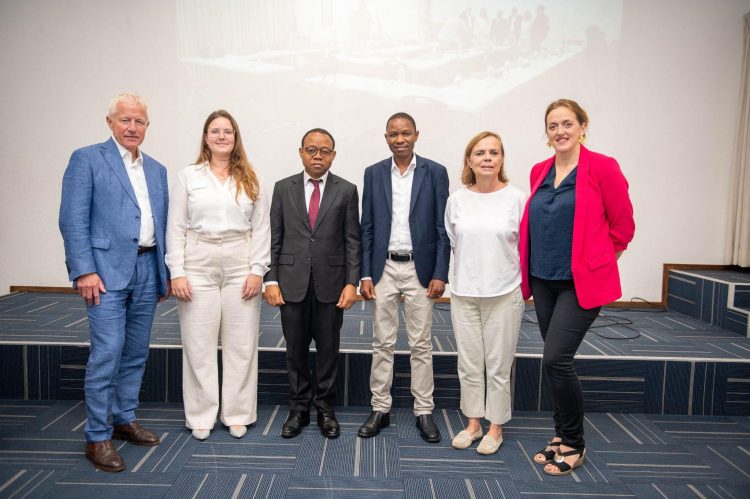
Dr Jabiri Kuwe Bakari - Director General of Tanzania Communication Regulatory Authority (TCRA), and Engineer Mr. Christopher John Assenga, Principal Engineer, TCRA, pose with the SPIDER team
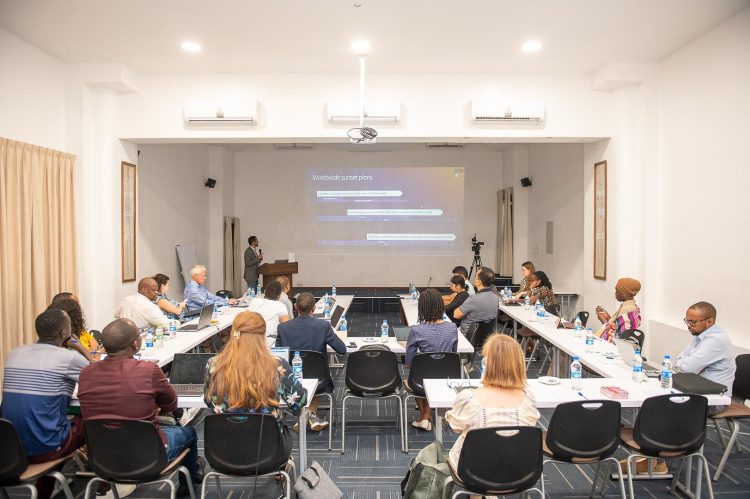
Talib Sheriff - Country Manager Ericson Tanzania presents regional and global insights on 2G, 3G and 5G to the participants.
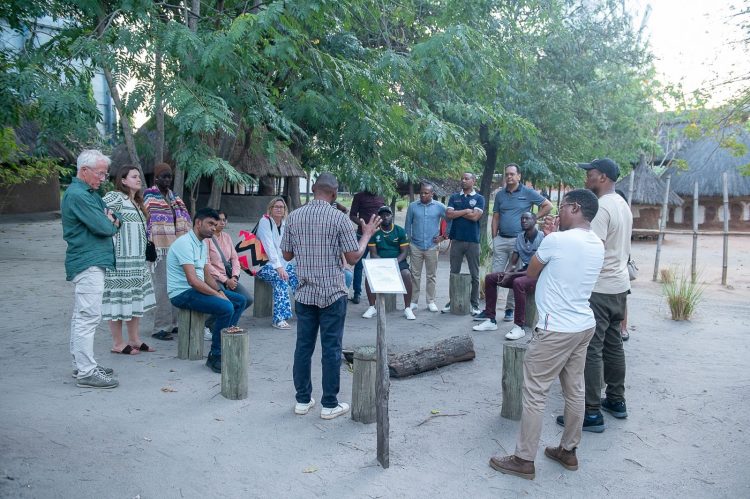
African and European experts taking part in the Africa Follow-up Week in Dar es Salaam visit the village museum in Dar es Salaam to learn about the traditions of various ethnic groups across Tanzania and how buildings were designed and reflected in everyday life.
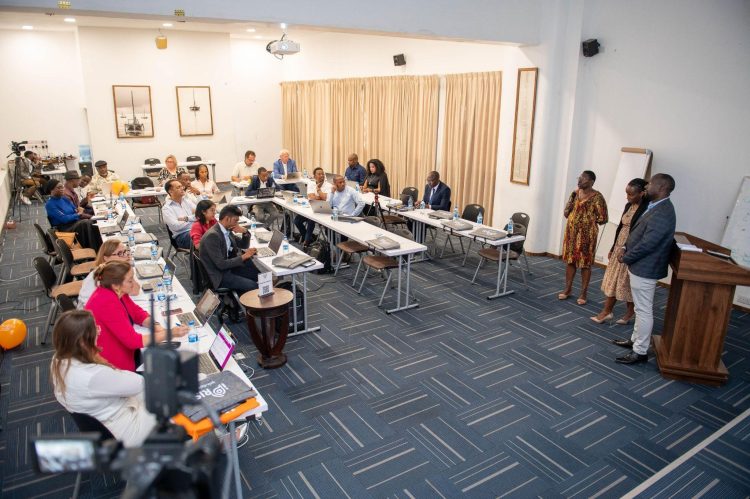
Uganda Communications Commission (UCC) presenting their Change Initiative to their peers (telecom experts). This allows the opportunity to celebrate progress and receive further input for improvement.
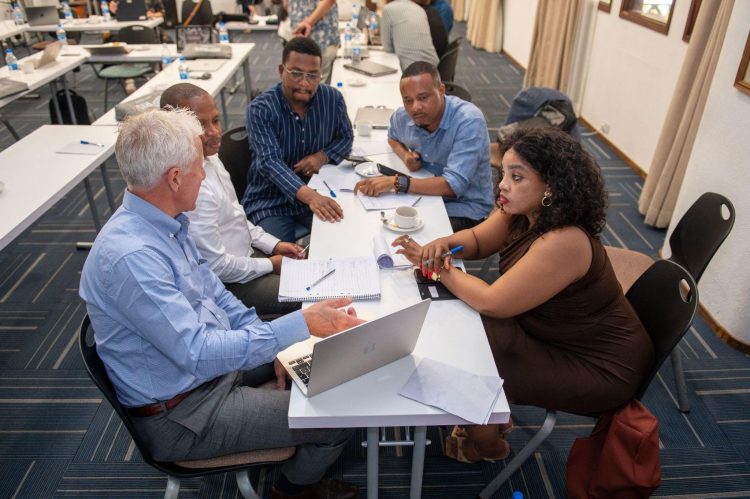
Peer-to-peer learning sessions in Dar es Salaam emphasising the critical role that Regional Regulatory Organisations have in facilitating cross-border collaboration and enabling regional harmonisation.
iPRIS is coordinated and implemented by SPIDER in strategic and technical partnership with the Swedish Post and Telecom Authority (PTS) and the Luxembourg Regulatory Institute (ILR).
The first-ever iPRIS peer-to-peer capacity building session for a French-speaking cohort was held in Luxembourg from September 8th to September 25th, 2024.
The two-and-a-half-week peer-to-peer learning session included participation from:
The African telecom regulators focused on launching their change initiative that will help address connectivity gaps or barriers to digital inclusion in their respective counties. The peer-to-peer training session covered various topics, including legal frameworks, market competition, consumer protection, and spectrum management.
Along the sidelines of the sessions, the participants explored various sites in the country, such as the Lëtzebuerg City Museum, the National Mining Museum, and the European Union Court of Justice.
After completing the capacity building training session, the African telecom experts received participation certificates, concluding their peer-to-peer comprehensive training experience.The participants will reconvene in Dakar, Senegal, in February 2025 to review their progress in the change initiative.
Selected photo highlights from the peer to peer training session in Luxembourg
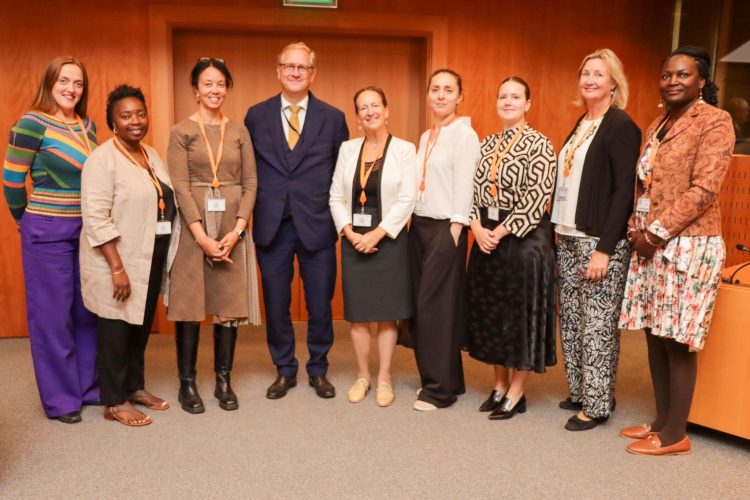
The iPRIS project implementation team at the European Court of Justice with Judge Ulf Öberg
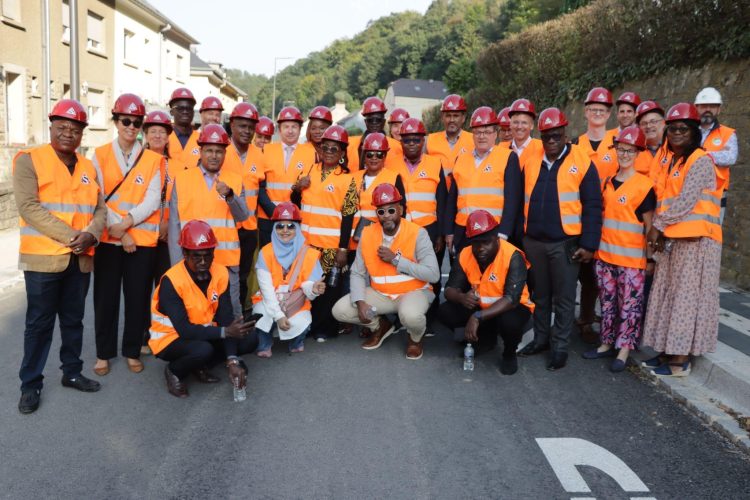
The participants during a field visit in the afternoon after a rigorous morning of peer-to-peer learning in their second week in Luxembourg
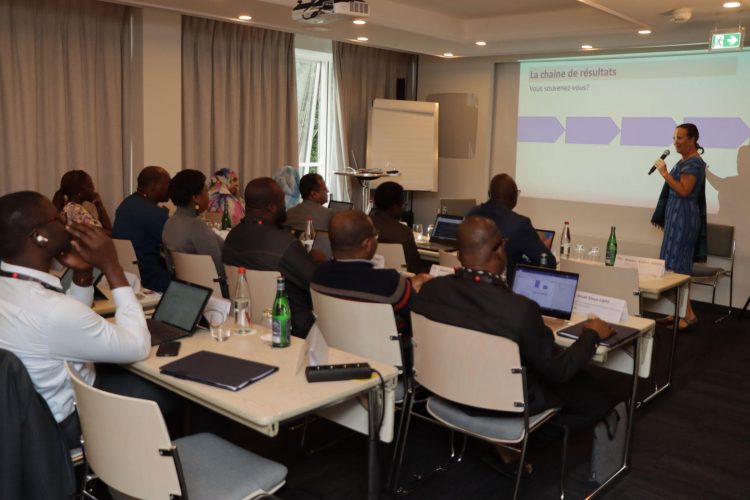
Ms. Malena Liedholm-Ndounou (SPIDER) facilitates a presentation on Universal Coverage
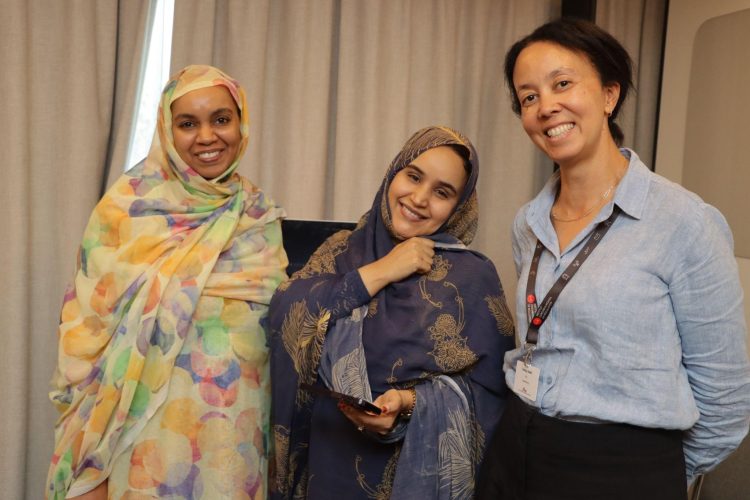
The Mauritanian team, Cheikha Mohamed Vall (left) and El Vaiza Badda (middle), together with Tantley Jeans (ILR).
At this year’s UN General Assembly, leaders came together to endorse the Pact for the Future, a forward-thinking agreement launched at the United Nations Summit of the Future. Signed on September 22, 2024, the pact lays out a clear path for rolling out advanced telecom systems and bridging digital divides across the globe.
Global Digital Compact: Connecting the World
The Global Digital Compact, which is the overarching objective of the Pact, is a crucial development in global digital cooperation. Its significance was underscored by UN Secretary-General António Guterres, who reiterated that:
"The Pact for the Future, the Global Digital Compact, and the Declaration on Future Generations open the door to new opportunities and untapped possibilities."
The Global Digital Compact sets out several important principles that will greatly influence the telecommunications industry among other sectors:
Sustainable Development and Digital Inclusion
Looking Ahead: A Connected Future
The adoption of the Pact for the Future and its associated commitments marks a significant milestone in global efforts to harness the power of telecommunications for sustainable development. According to the United Nations, More than 7,000 civil participants attended, resulting in pledges aggregating USD 1.05 billion for furthering a cause such as digital inclusion worldwide.
As we progress, the telecommunications industry will play a pivotal role in implementing these ambitious goals.
The President of the UN General Assembly aptly summarised the potential impact of the Pact:
"It will lay the foundations for a sustainable, just, and peaceful global order – for all peoples and nations."
With the globalisation of the world today, the telecommunications industry is in the vanguard of creating favourable opportunities. The undertaking made at the UN Summit of the Future offers a Vision for the Present and the Future which seeks to be inclusive, just, sustainable, and, most importantly, digitally empowered. Read More
From September 8-25, 2024, the first-ever iPRIS training for a French-speaking cohort of seven Francophone Africa national telecom regulators will take place in Luxembourg. The training will cover a
diverse range of topics including legal frameworks, market competition, consumer protection, and spectrum management. Participants will also visit several operators, the Court of Justice of the European Union, and cultural sites like museums and the Betzdorf and Vianden castles.
A key component of the iPRIS project is the planning and implementation of “Change Initiatives”, strategic projects designed to address specific challenges within each regulator's jurisdiction. These initiatives focus on tackling issues such as infrastructure gaps or digital inclusion barriers. Following the Luxembourg training, a regional support team will assist the regulators in implementing their change initiatives. The whole 2024B cohort will reconvene in Dakar, Senegal, in February 2025 to review progress and refine their projects. The effectiveness of the initiatives will be evaluated one year after the project’s commencement in 2025.
2024B will engage the telecom regulators of the Central African Republic, Chad, Comoros, Congo Brazzaville, Mauritania, Senegal and Togo. These national telecom regulators, also known as national
regulatory authorities (NRAs), are government-appointed organizations responsible for developing and implementing policies to safeguard consumers, ensure fair competition, and foster innovation within the ICT sector. iPRIS adopts a peer-based learning approach to enhance the capacities of NRAs, aiming to narrow the digital gap.
iPRIS is a joint effort by the Swedish Program for ICT in Developing Regions (SPIDER), Sweden’s Post and Telecom Authority (PTS), and Luxembourg’s Regulatory Institute (ILR). They collaborate with African
regional telecom regulators to support NRAs in achieving their strategic objectives.
For additional information, interested parties can contact Ms. Edna Soomre, the iPRIS Project Lead, at ipris@spidercenter.org
The International Telecommunication Union (ITU) hosted its annual Global Symposium for Regulators (GSR-24) in Kampala, Uganda from July 1 to 4, 2024, at the Speke Resort and Convention Center.
Themed "Regulation for Impact," GSR-24 brought together regulators, policymakers, and digital stakeholders from across the globe. The symposium offered a platform for knowledge exchange through thematic sessions focusing on critical issues in the rapidly evolving digital landscape.
The opening day featured a meeting of the Regional Regulatory Organizations and Digital Regulation Network (DRN). This session focused on accelerating sustainable digital transformation through collaborative approaches to digital policy, regulation, and governance across various economic sectors and borders. A key item on the agenda was the development of harmonized broadband mapping systems.
The DRN meeting also marked a significant milestone by celebrating its first successful year of operation. Participants took the opportunity to highlight the network's achievements, including knowledge sharing, capacity-building activities, and contributions to ITU-D Study Groups. The interactive workshops were also recognised as a valuable component of the DRN's efforts, underscoring the progress made in the past year.
Another significant event on the first day was the ITU GSR Heads of Regulators Executive Roundtable. This high-level discussion, which was a focal point of the day, concentrated on developing open, flexible, and risk-based governance structures for transformative technology. The roundtable featured rich interventions and discussions, highlighting the weighty challenges facing regulators in today's digital age.
Opening Ceremony at GSR-24
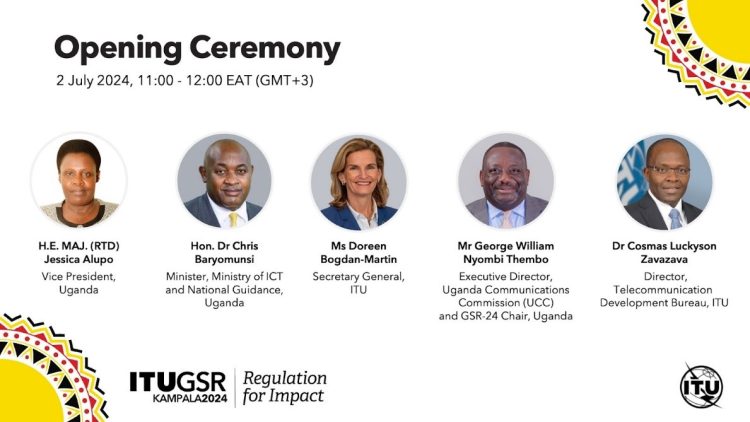
Day 2 of GSR-24 involved the opening ceremony led by a panel of stakeholders, including H.E. MAJ (RTD) Jessica Alupo (Vice President, Uganda), Hon. Dr Chris Baryomunsi (Minister, Ministry of ICT and National Guidance, Uganda), Ms Doreen Bogdan-Martin (Secretary General, ITU), Mr George William Nyombi Thembo (Executive Director, UCC, and GSR-24 chair, Uganda), and Dr Cosmas Luckyson Zavazava (Director, Telecommunications Development Bureau, ITU).
H.E. Jessica Alupo, representing President Yoweri Museveni, officially opened the symposium. In her address, she emphasised, "As regulators of the ICT sector, your mandate is to promote the sector's contribution to the economic well-being of the people." She added, "I urge you to promote a regulatory environment prioritising innovation, safety, privacy and the rights of digital technology users."
Ms Doreen Bogdan-Martin highlighted the urgent need to bridge the digital divide, noting that 2.6 billion globally still lack internet access. She stated, "We need to make the race to regulation a race to the top and not a race to the bottom." Bogdan-Martin called for accelerated efforts to bring these unconnected populations online, describing it as "both an economic necessity and a moral imperative."
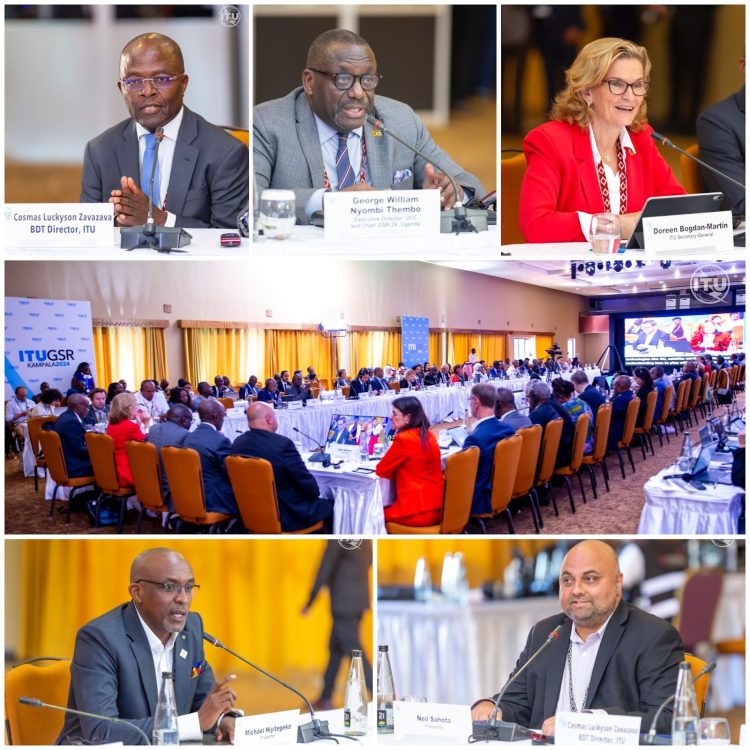
Dr. Cosmas Zavazava stressed the importance of collaboration: "Collaboration entails two-way frequent and dynamic communication among governments, the private sector, civil society, telecommunications regulators, and the average citizen." He emphasised the need for "formulating policies that are inclusive, and making significant investments in building the infrastructure."
Dr Chris Baryomunsi, welcomed delegates to the "Pearl of Africa" and highlighted Uganda's commitment to digital transformation. He stated, "The government of Uganda has prioritised digital transformation, as expressed in our national development plan number three, and also as a ministry as a sector, we are guided by a digital transformation roadmap."
George William Nyombi Thembo provided context for the symposium's importance, noting, "Access to the internet is no longer a luxury, it has become an absolute necessity. Denial of which means denial of essential services like education, medical care, and financial inclusion to mention but a few."
The symposium discussed key topics such as artificial intelligence governance, space technologies, and international cooperation in ICT regulation. Participants worked towards developing best practice guidelines for regulating emerging technologies to maximise their positive impact while minimising risks.
 From left: Dr Cosmas Zavazava (ITU) and Mr George William Nyombi Thembo (UCC)
From left: Dr Cosmas Zavazava (ITU) and Mr George William Nyombi Thembo (UCC)
The primary outcome of day 2 was the launch of the Best Practice Guidelines, by Dr. Cosmas Luckyson Zavazava from ITU and Mr George William Nyombi Thembo, the executive director of UCC.
Best Practice Guidelines are instrumental in shaping national policies, strategies and regulatory frameworks that foster investment, innovation and growth in the ICT sector. The ITUG SR-24 Best Practice Guidelines chart the course of transformative technologies for positive impact, outlining the challenges, opportunities, key policy and regulatory measures, and guiding principles for positive and inclusive impact in 6 languages.
Network of women in tech
On Day 3 of GSR-24, the Network of Women (NoW) session brought together influential voices to address the persistent gender gap in the ICT sector. Participants engaged in spirited discussions examining the obstacles that continue to hinder women’s advancement in technology-related fields, especially at the highest levels of policymaking. The session highlighted the challenges and explored solutions and mechanisms to boost women’s participation in these crucial roles.
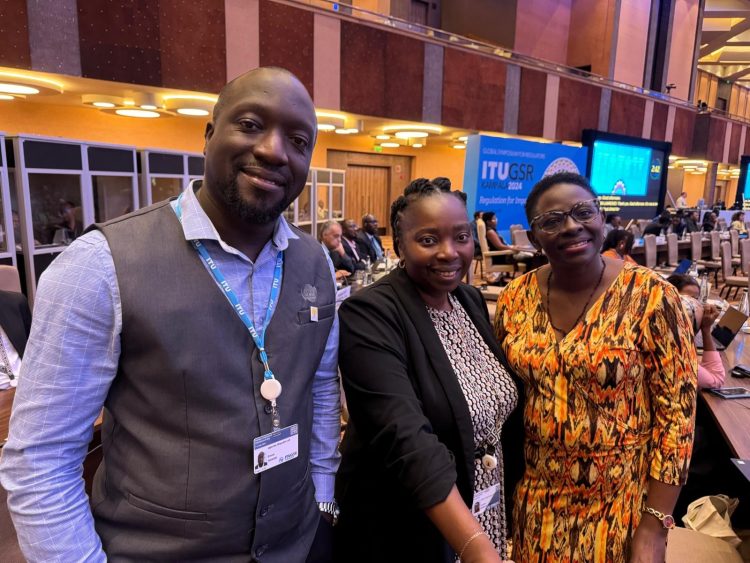 From left: Enock Wakabi (UCC), Dr Caroline Wamala (SPIDER), and Priscilla Namugerwa (UCC) at GSR-24
From left: Enock Wakabi (UCC), Dr Caroline Wamala (SPIDER), and Priscilla Namugerwa (UCC) at GSR-24
ITU Sec Gen Ms Bogdan-Martin expressed her inspiration from the stories of women’s leadership shared during the event. She called for renewed efforts to make 2025 a milestone year for gender equality, urging stakeholders to take concrete actions to close the gender divide in the digital sphere.
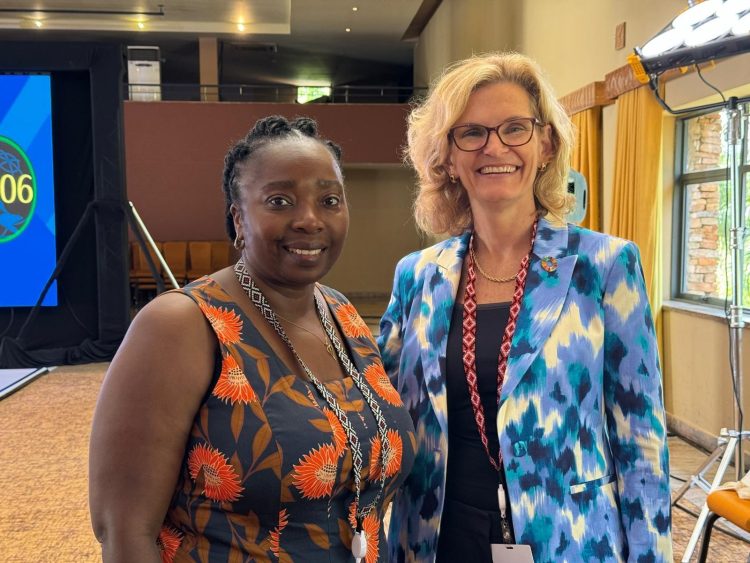 SPIDER director Dr Caroline Wamala (left) and ITU secretary general Ms Doreen Bogdan-Martin (right) at GSR-24
SPIDER director Dr Caroline Wamala (left) and ITU secretary general Ms Doreen Bogdan-Martin (right) at GSR-24
Other announcements at GSR-24:
In an era where digital connectivity is a catalyst for economic growth, the iPRIS (ICT Policy & Regulation - Institutional Strengthening) initiative stands as a beacon of hope for 43 African countries. This program aims to strengthen telecom regulatory bodies across Africa, fostering digital inclusion and bridging the digital divide through peer-to-peer capacity building.
The iPRIS initiative is a comprehensive approach to unlocking the development potential of Sub-Saharan Africa. By improving ICT service quality and leveraging digital technologies, iPRIS aims to enhance digital connectivity and inclusion, driving overall development in the region.
Among the 43 participating nations, French-speaking countries play a pivotal role. These include Benin, Burundi, Burkina Faso, Cameroon, the Central African Republic, Comoros, Côte d'Ivoire, DR Congo, Gabon, Guinea, Madagascar, Mali, Mauritania, Niger, Republic of Congo, Chad, Senegal, and Togo.
Benin (ARCEP Benin):
Burundi (ARCT):
Burkina Faso (ARCEP Burkina Faso):
Cameroon (ART Cameroon):
Central African Republic (ARCEP Centrafrique):
Comoros (ANRTIC):
Côte d'Ivoire (ARTCI):
DR Congo (ARPTC):
Gabon (ARCEP Gabon):
Guinea (ARPT Guinea):
Mali (AMRTP):
Niger (ARCEP Niger):
Republic of Congo (ARPCE Congo):
The iPRIS initiative is more than a policy framework; it is a transformative force driving digital inclusion and connectivity across Francophone Africa. By strengthening regulatory bodies and fostering cooperation, iPRIS is paving the way for a digitally empowered future in the region.
The "Interconnection and Access Catalogue 2023" from Togo Telecom is more than a technical document; it reflects the dynamics of Information and Communication Technologies (ICT) in Africa. In a continent undergoing a digital transformation, regulations and interconnection offers play a crucial role. This article explores how this catalogue fits into the African ICT landscape and the impact of regulations on this rapidly growing sector.
Objective and Scope of the Catalogue
Togo Telecom's catalogue aims to clarify the offers and conditions for collaboration with other operators, an essential need in an African environment where connectivity is constantly expanding. By providing detailed and transparent information, Togo Telecom promotes effective cooperation, thus facilitating the extension of telecommunications services in Togo and beyond.
Services Offered
Interconnection services are at the heart of ICT infrastructure in Africa, and Togo Telecom offers a comprehensive range to meet these needs:
Pricing
Clear and transparent pricing is essential in the African context, where costs can be a barrier to ICT adoption. Installation fees, recurring fees, and specific charges are clearly detailed, allowing operators to effectively plan and budget their interconnection investments.
Access Conditions Access conditions to Togo Telecom's services are designed for seamless integration, reflecting best regulatory practices. Technical requirements and contractual terms are clearly defined, ensuring compliance with international standards. This alignment with regulations builds partner confidence and stimulates innovation in ICT.
Stakeholders Key stakeholders include telecommunications operators and regulatory authorities. In Africa, these actors play a crucial role in ICT development. Togo Telecom's catalogue provides the necessary information for effective collaboration, ensuring regulations are adhered to and services are delivered according to established standards.
Performance Indicators The performance indicators defined by Togo Telecom are essential for ensuring service quality and reliability, critical aspects in the African context. Availability rates and repair times are key measures to ensure service continuity, while customer satisfaction reflects Togo Telecom's commitment to its partners.
Illustrations and Examples The catalogue includes diagrams and tables illustrating service options, pricing, and expected performance. These illustrations are particularly useful in the African context, where visualizing data facilitates understanding and decision-making, enhancing transparency and ICT adoption.
The "Interconnection and Access Catalogue 2023" from Togo Telecom is much more than a technical document; it is a strategic tool for ICT development in Africa. By offering detailed and transparent information on services, pricing, and access conditions, Togo Telecom supports the expansion of telecommunications on the continent. Regulations play a crucial role in ensuring compliance and stimulating innovation, enabling Africa to realize its digital potential. Stakeholders are encouraged to consult this document to maximize the opportunities offered by Togo Telecom in 2023 and beyond.
In 2023, the mobile telephony market in Congo is dominated by two main operators: MTN and Airtel, following the cessation of Azur's activities despite holding its license. These two players serve more than 5.9 million subscribers, mainly prepaid representing 99.3% of the market (Rapport 2023 du Marché de la telephonie mobile au congo ...).The 2023 report on the mobile telephony market in Congo offers a detailed analysis of the sector's performance over the year, with a focus on key indicators such as subscriber numbers, voice and SMS traffic, revenues generated, and weighted outgoing tariffs. It aims to inform the strategic decisions of operators and regulators, taking into account regulatory developments and technological challenges.
Trends
The mobile telephony penetration rate reached 94.6%, up slightly on the previous year, with total revenues of CFA F 136.071 billion in 2023, mainly generated by outgoing traffic.
The market recorded total voice traffic of 6.586 billion minutes and SMS volume of 5.442 billion messages. Despite apparent saturation, the market is showing modest but steady growth in the number of subscribers.
The sector is constantly evolving to meet new technological and economic realities, with ARPCE playing a crucial role in regulatory developments, such as the revision of tariffs to increase market competitiveness. Technological challenges include the deployment of network infrastructure, the adoption of 4G and preparation for 5G, as well as securing against cyber-attacks and managing the growing volume of data.
MTN dominated the market with 72.4% of total revenues, while Airtel accounted for 27.6%. MTN saw its revenues increase by 7.5% in 2023, while Airtel saw a slight decline of 0.4%.
Challenges and opportunities
For 2024, the forecast includes continued growth in subscriber numbers, investment in infrastructure to extend 4G coverage and introduce 5G, and a downward trend in tariffs to stimulate consumption of voice and data services. Innovation in service packages, diversification with value-added services, and transparency in pricing practices are essential to support a competitive and sustainable market. ARPCE will continue to play a key role in monitoring the market, promoting access to new technologies, and ensuring healthy and transparent competition.
Developing regions offer fertile ground for the development of mobile telephony. With sustained demographic growth and increasing urbanization, these regions represent an expansive market for telecoms services. The extension of mobile telephony networks can play a crucial role in bridging the digital divide by facilitating access to communication and information services, even in remote rural areas. This could stimulate economic development by improving access to markets, supporting local entrepreneurship, and enhancing access to education and healthcare. In addition, technological innovation, such as the introduction of 4G and the future 5G, could transform connectivity by offering faster broadband deployment and increased capacity for data processing.
These advances pave the way for new value-added services such as mobile payment, healthcare applications, and distance education platforms, responding to the diverse needs of local populations. Finally, public-private partnerships for infrastructure development will play a crucial role in mobilizing the necessary resources and ensuring efficient network deployment, thus contributing to sustainable and inclusive economic growth in developing regions.
Lomé, Togo, played host to the 21st seminar of Fratel, the network of French-speaking telecom regulators, on May 21-22, 2024. The event was organized by the Togolese national regulator ARCEP TOGO and the Congolese national regulator ARPCE, the current president of Fratel. The seminar welcomed 18 Fratel members including ILR, the technical partner for the French-speaking rounds of iPRIS, SPIDER, and various industry players. The theme of the seminar was "The data economy and mobile payment: what are the technical and economic regulatory challenges?"
With the acceleration of digitization, data access and exchange have become crucial to economic and social development. It is essential to create a secure environment to encourage the sharing and effective use of data, notably through open access. At the same time, the dramatic increase in data production has stimulated the development of data storage and processing infrastructures, particularly via the cloud, on a global scale.
In a world where every click, every transaction generates an avalanche of data, understanding and regulating this flow is becoming essential. The seminar kicked off with an inspiring presentation by Cina Lawson, Togo's dynamic Minister for the Digital Economy. She captivated the audience with a compelling vision of Togo's digital transformation, highlighting groundbreaking initiatives that are setting new standards in the region.
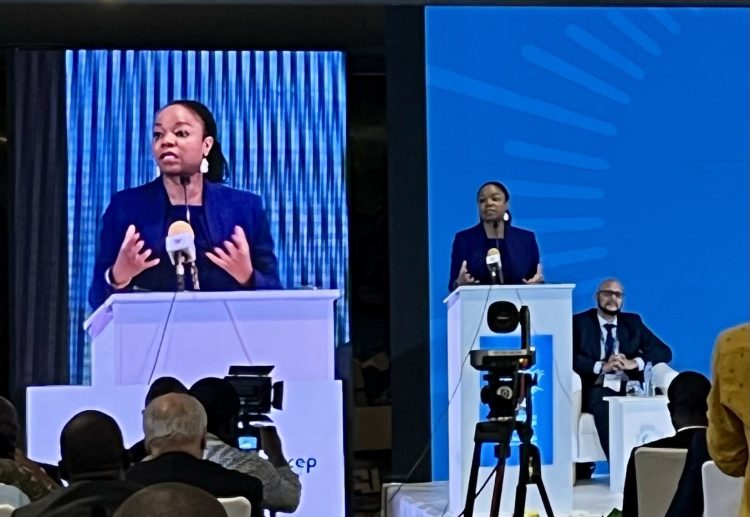 Cina Lawson, Minister of Digital Economy, Togo. ©
Cina Lawson, Minister of Digital Economy, Togo. ©
The seminar was structured around three main panels, each addressing crucial aspects of regulation in the digital economy.
Data economy development
The first panel focused on the development of the data economy, a key issue in the digital age. The data economy refers to all economic activities and processes based on the use of data. It encompasses various practices, technologies and business models centered on the collection, analysis, sharing and use of data to create value.
This first panel, chaired by Marc SAKALA, Managing Director of ARPCE in the Republic of Congo, was introduced by David Guitton, Attorney at Jones Day.
As David Guitton astutely noted, "The data economy implies valuing data. It is the use of data that determines its value".
He stressed the importance for the State to provide a technical and legal framework governing access to data, and a regulatory framework enabling access to data between players (associations, labels, groupings...).
Ms. Laure de la Raudiere, President of ARCEP France, emphasised the importance for Europe of ensuring that digital transformation benefits European citizens and businesses. The seminar was structured around three main panels, each addressing crucial aspects of regulation in the digital economy.

Having explored the fundamental aspects of the data economy, the seminar progressed to the second panel, which looked at an equally crucial theme: "What public interventions to remedy potential market failures in data storage and processing. "
Public intervention in Data storage and processing
The data storage and processing market refers to all the services, technologies and solutions that enable companies and organisations to store, manage and process their data efficiently and securely. It was chaired by Luc TAPELLA, President of ILR (Luxembourg). In her introduction to the session, Ms Rihab RABBAJ, Analyst at Cullen International, highlighted the fundamental aspects and challenges of cloud computing services.
Among the speakers, Daniel ANOUGBA, Head of "Infrastructure Sharing and Access" at RTCI Côte d'Ivoire, focused on data processing market failures, initiatives taken and future prospects in his presentation.
Achille HUNYO, Service and Productivity Supervising Engineer at Ecobank, gave a presentation on public interventions to remedy potential failures in the data storage and processing market.
Jean Francis AHANDA, General Manager DATA CENTER services at ST digital, emphasized: "It is now accepted that the massification of data produced and its circulation are revolutionizing the economy. At once a strategic asset and a decision-making, action and production tool for companies, data is at the root of new decision-making processes and unprecedented alliance strategies between companies in different sectors, just as much as it is provoking new confrontations between economic players." Read more
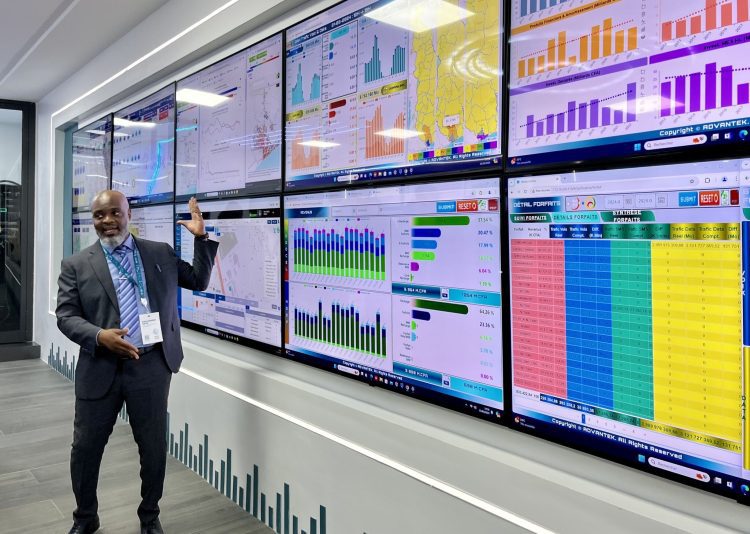
After gaining a clear understanding of the challenges and interventions required in the data storage and processing market, the seminar then turned its attention to a hot topic: mobile payments.
Sharing experiences on mobile paymentsc
This third panel provided an opportunity to exchange experiences and perspectives, highlighting how this technology is revolutionising financial transactions and promoting economic inclusion. Mobile payments refer to financial transactions carried out using mobile devices such as smartphones and tablets. They enable users to purchase goods and services, transfer money and manage their finances via mobile applications or services.
With insightful keynote speaker Vinyo CAPO, Director of Markets and Data Regulation at ARCEP TOGO, the third panel plunged into the fast-changing world of mobile payments. Mawuli COUCHORO set the scene with a powerful introduction highlighting both the immense opportunities and formidable challenges presented by this technology.
This was followed by contributions from :
Régis ONDO MORO, Director of Markets at ARCEP GABON, who emphasised:
"It should be noted that Mobile Money enables greater financial inclusion of populations through its ability to offer financial services, particularly in rural areas, enabling inequalities to be reduced."
Mrs. Fatou Gueye, Deputy Director of Means and Payment Systems at BCEAO, cited examples of initiatives in certain countries, such as offering free access to certain essential services (the case in South Africa), promoting low-cost data offers for low-income users (the case in India), and deploying free wifi access points (the case in Kenya).
Mr. Sefa HUSUNUKPE, Mobile Money Director at Togocom, gave a brief overview of the mobile payment ecosystem in Togo. According to him, the available offers are still insufficient due to a number of challenges, namely: users' preference for liquidity, limited literacy and low levels of financial education, user identification, user security, and the compartmentalization of the ecosystem.
Achille Tefong VAUMI, Market Engagement Manager for the Mobile Money Program in Francophone Africa at the GSMA, presented an overview of mobile money, with figures supporting its overall growth in Africa, and the GSMA's position on interoperability in mobile money. Interoperability in mobile money refers to the ability of different mobile payment systems and financial networks to work together seamlessly. This enables users to transfer funds, make payments and receive money between different mobile money platforms, banks and other financial services.

In closing, Fratel's seminar in Lomé was not only a platform for intellectual exchange, but also an opportunity for SPIDER and ILR to exchange views with the regulators who will be taking part in the first French-speaking iPRIS cycle, which will begin with training in Luxembourg next September.
In addition to the high-level panels, participants visited ARCEP Togo's headquarters and were impressed by their data collection and analysis capabilities, as well as the availability of data for the general public. Togolese culture was also on show.
Fratel, the French-speaking telecommunications regulation network created in 2003, aims to contribute to training and collaboration between its members. In 2024, Fratel will be chaired by ARPCE Congo, and in 2025 by ARCEP Gabon.
Borgarfjordsgatan 12, Kista,SWEDEN
Postal Address: Stockholm University, Department of Computer and Systems Sciences/DSV, SPIDER, P.O Box 1073, SE-164 25 Kista, Sweden
Copyright © 2024 iPRIS. All rights reserved.